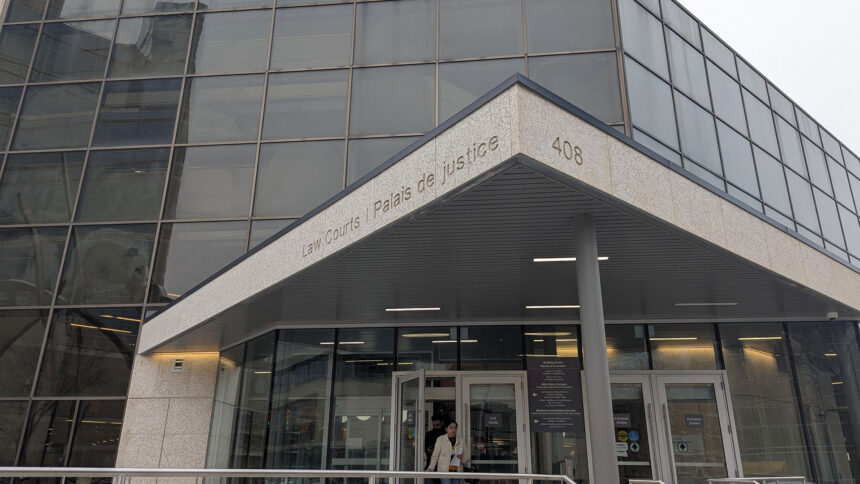The province of Manitoba has filed notice that it intends to fight a proposed class action lawsuit against it over birth alerts, arguing that the plaintiff in the case waited too long to sue. The lawsuit was filed by Carol Harper, a mother from Winnipeg whose baby was taken by Child and Family Services (CFS) in 2019 shortly after birth. In an amended statement of claim, filed in 2023, Harper said that happened because of a “birth alert” — a message CFS sends to hospitals warning when newborns are at risk. A video of the moment when Harper’s child was seized was live-streamed on Facebook. The video went viral and is still publicly available. The story was previously reported by APTN News in 2019, but Harper’s name wasn’t shared because of laws preventing the media from reporting the names of families involved with child welfare. Now that she has filed a public court case, her identity is part of the official record. The lawsuit asks the court to declare the alerts unconstitutional, to order the government to erase all records tied to them, and to pay damages. The case was filed as a class action, meaning it could represent others across Manitoba who were subjected to birth alerts. That certification hasn’t happened yet. But Harper’s lawyers are looking to speak to other potential plaintiffs. To certify a class action, a judge must be satisfied that the case involves a clearly defined group of people, common legal issues, and a lead plaintiff who can fairly represent others. Harper is acting as the lead plaintiff. Harper’s child was taken into care in January 2019 after a birth alert was issued, but the original lawsuit wasn’t filed until March 2022 — outside the two-year window that was in place at the time. In a written decision dated August 13, 2025, Justice Shawn Greenberg said the question over the statute of limitations needs to be answered first. If it is determined that the deadline has passed, the lawsuit could be stopped before it goes any further. The move by Manitoba justice officials runs counter to the Truth and Reconciliation Commission’s call to action 26, which calls on governments to “amend their respective statutes of limitations to ensure that they conform to the principle that governments and other entities cannot rely on limitation defences to defend legal actions of historical abuse brought by Aboriginal people.” The practice has long been criticized by Indigenous leaders because birth alerts are stacked against families. The final report of the National Inquiry into Missing and Murdered Indigenous Women and Girls said the alerts are “racist and discriminatory and are a gross violation of the rights of the child, the mother and the community.” Months before British Columbia officially ended the controversial practice of birth alerts, government lawyers advised that the practice was “illegal and unconstitutional” and posed a “litigation risk,” according to records obtained by IndigiNews. Manitoba ended the process in 2020. If the case is allowed to proceed, the next step will be for Harper and her lawyers to try to have the case certified. If successful, a notice would be sent to all potential class members. ‘Blindsided:’ Manitoba officials seize newborn from mother in hospital Winnipeg newborn seized during livestream video returned to family The legal case against birth alerts—and the province’s defence The statement of claim argues that birth alerts were issued without legal authority, often based on discriminatory assumptions rather than evidence of harm. Once flagged, individuals were placed under surveillance, their personal and medical information was shared without consent, and in many cases, newborns were taken into care at birth. The proposed lawsuit said this violated sections of the Charter of Rights and Freedoms, which protect liberty, security of the person, and equality. It also cites Manitoba’s own privacy legislation, saying the province disclosed confidential health information without justification. The result, the claim said, was deep trauma, stigmatization, and loss of parental bonds. In its official response to the lawsuit, filed in March 2023, the Manitoba government maintains its actions were lawful and justified. It said birth alerts were legal and were used to protect children, not to punish parents. Even if someone’s rights were affected, the province argues, the need to keep children safe came first. Mother, province offer conflicting accounts of birth alert Harper was admitted to St-Boniface Hospital in Winnipeg by ambulance on Jan. 7, 2019, and gave birth the next day. On Jan. 10, Winnipeg CFS arrived at the hospital. A number of Harper’s family members were present. Police were called by hospital security to help remove the newborn. According to a statement of claim, filed Feb. 15, 2023, Harper said she didn’t know the government had issued a birth alert in her name until after her baby was born and officials showed up at the hospital. Filings by the province dispute that, saying that CFS workers met with Harper days before she gave birth and advised her they would be apprehending her child due to concerns over substance abuse. The province also states that CFS “was informed by a source of referral” that Harper was “displaying signs of alcohol use” when she attended hospital by ambulance on Jan. 7, requested opiate painkillers after the birth and did not appear to be adequately responding to the child’s hunger cues. Harper had given birth by emergency C-section because the baby was in a breech position. Continue Reading
Province of Manitoba challenges birth alert lawsuit over statute of limitations

Leave a Comment









